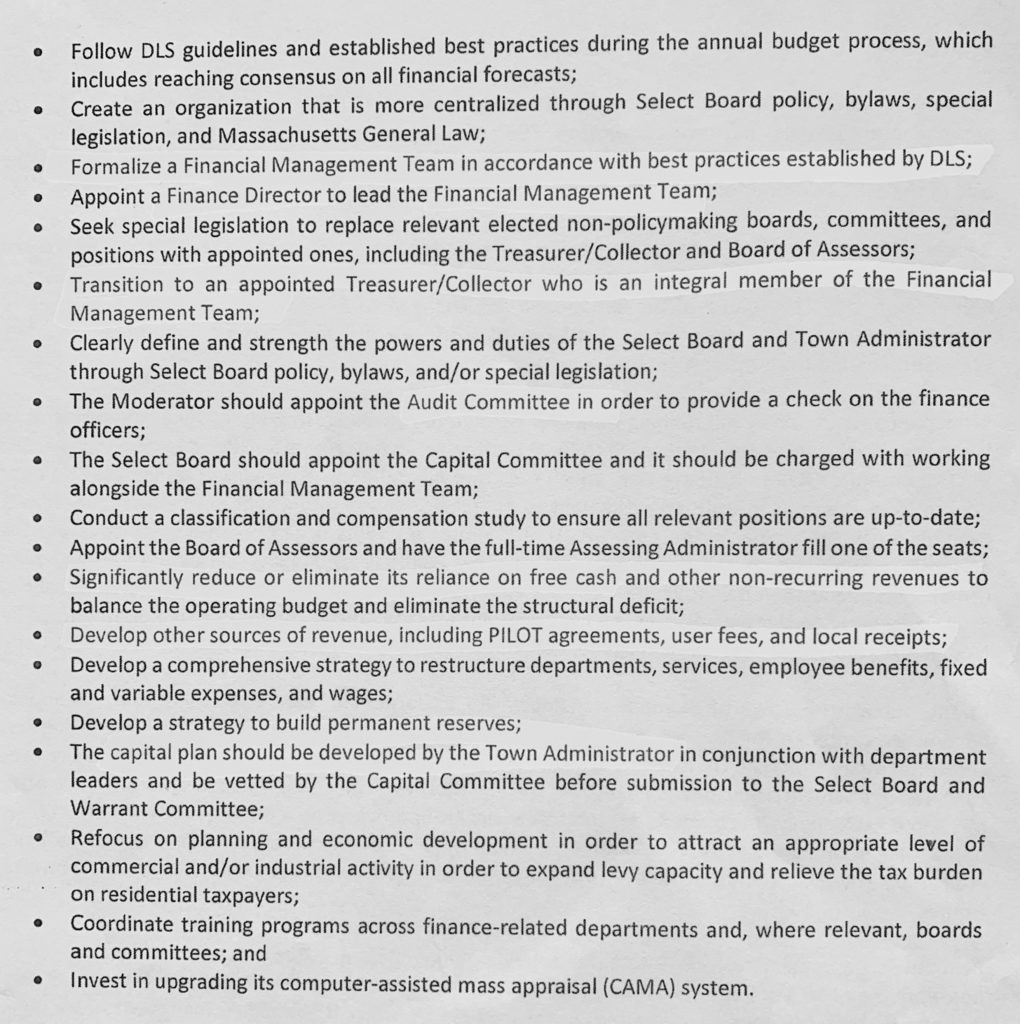Photo: The Collins Center’s Stephen Cirillo
Stephen Cirillo did not mince words: an on-going structural deficit will result in Belmont “facing a significant financial challenge” in the next years.
Yet Cirillo’s statement was hardly a Cassandra-like message; everyone knows it’s only so true. In fact, Cirillo has been before the town for the past four years sounding that same alarm and voters passed a Proposition 2 1/2 override in 2015 to fill the town’s coffer emptied by an earlier fiscal imbalance. But in a damning review of the town’s financial structure by the Edward J. Collins, Jr. Center for Public Management at UMass Boston presented before a joint hybrid meeting of the town’s major committees and boards on Wednesday, Aug. 3, the ability of Belmont’s leaders to effectively face the current fiscal precipice is hindered by an antiquated governmental framework that mutes any opportunity to come to grips with the issues.
“We are concerned that underpinning the current financial challenges is an overall organizational structure that may be unable to meet these difficulties,” said Cirillo, a staff associate at the Center.
In one example that surprised the reviewers, no where in the town’s bylaws or special acts in the 162 years since the town was incorporated was the Select Board ever declared as head of the executive branch.
“Belmont is one of the most decentralized town structures” of its size existing in the Commonwealth, said Cirillo, in which varying committees, boards and elected officials deals with certain aspects of the town’s financial landscape but not the whole “in an inherently uncoordinated fashion.”
“Individually, none of these is necessarily unusual or problematic,” reads the report, but put together, “[it] creates a significant diffusion of responsibility and authority across the executive branch” which is unusual for a large town such as Belmont.
The initial reaction from the officials and the public was an acceptance with an acknowledgment that the recommendations must be seriously considered.
“I thought the report was incredibly well done. Very comprehensive and pointed,” said Mark Paolillo, chair of the Select Board. “So I welcome these recommendations. They are fairly robust.”
Seven months and 18 interviews
The review was initiated by Town Administrator Patrice Garvin and the Select Board which received a state grant 18 months ago to look at the town’s financial structure with the Collins Center which has assisted the town previously on developing financial policy and revenue forecasts. The report took seven months to complete with 18 of 19 town officials, employees, appointees and a resident on the Center’s interview list participating in hour-long sessions between November 2021 and February 2022.
While the review spotlighted the structure of town governance, it also pointed out the lack of fiscal “best practices” in its budgetary process. Belmont has been able, so far, to stave off the financial crisis of the structural deficit in the past seven years by using non-recurring funds such as free cash and state and federal and state grants, Cirillo said that approach is simply not sustainable “and you’re rapidly approaching the financial cliff” when one-time revenue will not fill the gap between recurring revenue and expenditures. When that occurs, the only option will require cuts to essential services – education, public safety, public works – or seeking a series of overrides to balance the budget.
While the conditions creating the structural deficit remain, Cirillo presented a list of recommendations that would bring historic change to Belmont’s governmental model and budget process since the town’s founding in 1859. The 19 recommendations [see a copy at the bottom of the page] are not radical in any sense, said Cirillo. In fact, they would bring Belmont in line structurally with nearly all cities and towns in the Commonwealth including comparable towns.
Read the 40-page Financial Organization Structure Review here.
At Wednesday’s meeting, Cirillo pointed to three key recommendations as essential to put Belmont on the path towards. One is to revamp the town’s current annual budget process into a formalized financial planning cycle by adopting guidelines and best practices developed by the state’s Division of Revenues’ Department of Local Services.
Calling the new planning cycle ”very simple,” Cirillo said each player – be it the town administrator, the select board or department head – has a specific timeline to do their specific tasks and move it forward to the next step. ”And each person, each committee has their responsibility to make their decisions themselves, independent of a group meeting,” he said.
Another main recommendation is to define and strengthen the powers and duties of the Select Board and Town Administrator via new bylaws, changes in policy and through special legislation so that “everything should flow through the Select Board and the representative Town Administrator,” said Cirillo.
“We believe that the Town’s executive branch is not configured in a way that aligns authority, responsibility and accountability,” said the report.
The third recommendation is for the Select Board to take the lead in determining what policies will guide the budget process. Cirillo said once the agreed-to revenue expenditure forecast is presented and reviewed, the board would issue policy directives such as how much should be spent on capital projects, set department hiring freezes to forestall layoffs or call for draft budgets that show the effects of reductions to their assigned revenue.
”These budget guidelines would flow to the town administrator who would then send a directive to the department heads, including the school department, at the beginning of the budget process,” said Cirillo.
Once the department budgets are returned at a date certain, the Town Administrator will prepare a budget recommendation back to the Select Board and Warrant Committee both who will meet with the individual departments “which should have the right to advocate for revenue … for the services they deliver,” said Cirillo.
”Ultimately, the Select Board will make their budget recommendation to Town Meeting with the Warrant Committee making their own budget recommendation to Town Meeting,” said Cirillo, noting it’s likely those recommendations will be very close in their final numbers ”because all budgeting is incremental in nature.” If there are differences in opinion, the board and the committee should seek to reconcile their differences. If not, the Warrant Committee can bring its budget to the town’s legislative body and the Select Board can ask for an up or down vote, he said.
New finance director to lead new financial management team
Cirillo was happy to see one of the 19 recommendations has been implemented with the “excellent” hire of Jennifer Hewitt as the town’s assistant town administrator and finance director who will chair a new Financial Management Team. The team will hold regular meetings to “create opportunities to develop new ideas and analyze the impact of upcoming fiscal events … and offer early strategies to deal with anticipated areas of concern.”
Other recommendation calls for the transition of the Town Treasurer position and the Board of Assessors from elected to appointed posts as well as finding other sources of revenue from economic development that will attract an appropriate level of commercial and industrial activity.
The Warrant Committee’s Jack Weis said his concern was the school district makes up 60 percent of the town’s budget and while town and schools have worked collaboratively, “there’s no guarantee that could work and there’s been examples where that didn’t work.” While Cirillo said the school committee does control the school department, it remains a department with the town of Belmont and the Select Board and Warrant Committee are responsible for creating the budget for the town.
“They should be working with the superintendent of school … or make every effort to do so and they succeed more times than not,” said Cirillo, noting that the schools will be part of the budget process every step of the way and they will know the fiscal reality the town is working in.
”The budget is driven by the executive and the executive is the Select Board represented by the town administrator and the warrant committee represents the Town Meeting,” said Cirillo.
Much what the Collins Center is recommending is not new. In fact, many of the suggestions were first proposed in a 2011 financial management review conducted by the state’s Division of Local Services. ”We implemented a handful of recommendations, many which we did not,” said Paolillo. ”When reading the report, I was not surprised to see that a lot of the recommendations from 11 years ago were in this report.”
While Wednesday meeting was the release of the report, a subsequent public meeting on Aug. 29 will be used to plan a path forward, said Paolillo.
”We can’t make changes in a vacuum” it will need consensus of town and elected officials as well as the public ”because some of the recommendations, I would say, are maybe controversial,” said Paolillo.
”It’s not the end of the discussion,” said Paolillo. ”It’s the beginning of our deliberations. This will be an ongoing dialogue … so we need your thoughts and input.”









WHOW!!!! I hope the elected officials and the town’s people will see this and make Belmont livable within the limits ALL the residents can afford. It may take some time, but I hope it will happen in my lifetime.